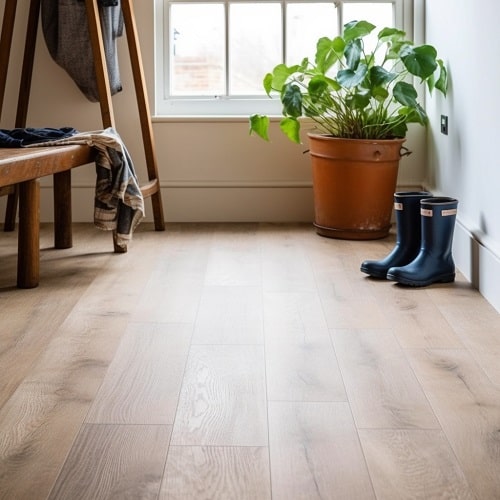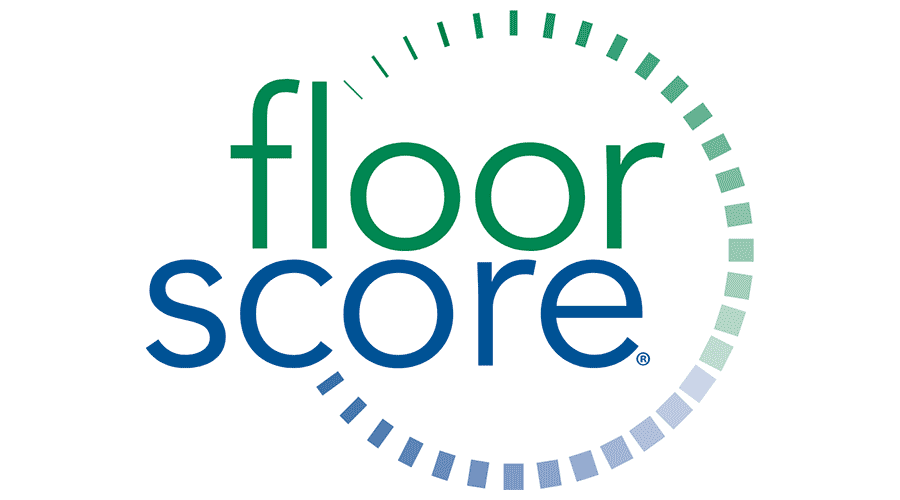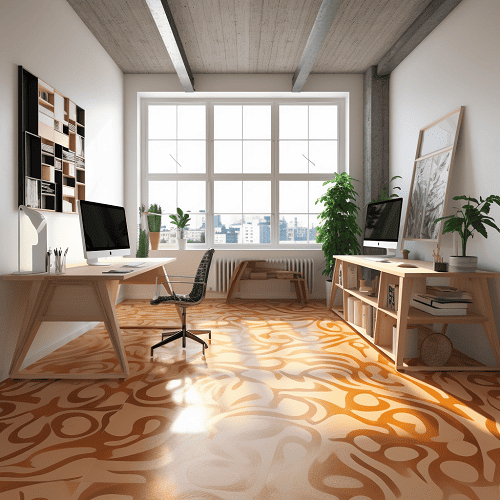- You are here:
- Home »
- Non Toxic Home Poducts »
- What Does FloorScore Certified Mean?
What Does FloorScore Certified Mean?
Indoor air quality is an essential aspect of our everyday lives, affecting both our living and working spaces. With growing concerns about the impact of pollutants on our health, certifications like FloorScore have become increasingly important.
In this article, we’ll dive into what FloorScore certification means and why it’s crucial for maintaining healthy indoor environments.
Getting to Know FloorScore Certification
The FloorScore program is a joint effort between the Resilient Floor Covering Institute (RFCI) and Scientific Certification Systems (SCS), aiming to tackle volatile organic compounds (VOCs) emitted by flooring and other building materials. These VOCs can negatively affect indoor air quality, so it’s essential to address them.
To obtain FloorScore certification, flooring manufacturers must meet strict criteria and go through extensive testing. This process includes emission testing to measure VOCs released by the product, ensuring compliance with strict chemical limits, and verifying adherence to environmental and health standards.

What Products Get Certified?
When it comes to FloorScore certification, a wide range of flooring products can undergo the rigorous testing and evaluation process. Whether you’re considering a renovation project or building a new space, knowing which types of products can obtain the coveted FloorScore certification is helpful.
Solid Vinyl Tile:
Solid vinyl tiles, or luxury vinyl tiles (LVT), are a popular choice for residential and commercial spaces. These tiles offer durability, easy maintenance, and a wide range of design options.
Vinyl Composition Tile:
Vinyl composition tile (VCT) is a cost-effective flooring option commonly used in commercial settings, such as hospitals, schools, and offices. It provides durability, resistance to wear and tear, and easy maintenance.
Flexible Luxury Vinyl Tile:
Flexible luxury vinyl tile (LVT) offers the same aesthetic appeal as solid vinyl tile but with added flexibility. This flooring option is known for its versatility, making it suitable for various applications and spaces.
Heterogeneous Sheet Vinyl:
Heterogeneous sheet vinyl is a durable and resilient flooring option that offers a broad range of design possibilities. It is commonly used in high-traffic areas, such as healthcare facilities and educational institutions, where durability and aesthetics are crucial.
Homogeneous Sheet Vinyl:
Homogeneous sheet vinyl is a popular choice for commercial and institutional spaces that require a flooring solution with superior performance and longevity. This type of vinyl flooring offers consistent color and pattern throughout the material, ensuring a seamless and attractive look.
Read More: Is Vinyl Flooring Toxic?
Rigid Core:
Rigid core flooring, often referred to as engineered vinyl plank (EVP) or multilayer flooring, has gained popularity for its durability, water resistance, and ease of installation. With a rigid core construction, this type of flooring can withstand heavy foot traffic and moisture-prone areas.
Linoleum:
Linoleum is a resilient flooring option that can be made from natural materials, such as linseed oil, wood flour, and cork dust. It is known for its eco-friendliness properties, durability, and wide range of colors and patterns.
Rubber:
Rubber flooring is a durable and slip-resistant option commonly used in commercial settings, gyms, and healthcare facilities. It offers excellent impact resistance, sound absorption, and easy maintenance.
Cork:
Cork flooring is an eco-friendly option made from the bark of the cork oak tree. It offers natural thermal and acoustic insulation, durability, and a unique aesthetic appeal.

Why Choose FloorScore Certified Products?
Improved Indoor Air Quality
FloorScore certified products play a significant role in enhancing indoor air quality. By limiting VOCs and other harmful chemicals’ emissions, these products reduce the risks associated with poor air quality.
The main concern associated with VOC exposure are health risks, such as headaches, respiratory problems, and even cancer. Choosing FloorScore-certified flooring materials for residential, commercial, and institutional spaces ensures a healthier and more comfortable indoor environment.
Regulatory Compliance
Manufacturers with FloorScore certification demonstrate their commitment to meeting environmental and health regulations. By choosing FloorScore certified products, you’re helping maintain regulatory compliance in building projects and supporting responsible environmental stewardship.
Sustainability and Environmental Stewardship
FloorScore certified products align with sustainable practices and eco-consciousness. It includes products with recycled content, sustainable raw materials, and efficient production processes. So you can get flooring materials with minimal environmental impact and high performance.
Who Can Benefit from FloorScore Certification?
Whether you buy FloorScore products for your home or for a commercial space, you can be sure of their quality. This certification is beneficial for everyone, including architects, designers, builders, and property owners.
Architects: Architects can choose the right flooring materials for their projects with confidence. With FloorScore certification, they can select products that meet customer expectations while complying with health and environmental regulations.
Designers: Designers can select from a variety of certified products that offer superior performance and aesthetics. With the product’s certification, designers can confirm their selections meet strict environmental standards and requirements.
Builders: Builders looking for materials with superior quality and durability can choose certified products without any worries. The certification confirms they’re using high-performing and safe materials in their projects.
Property Owners: Property owners can select the right flooring for their home or office space with peace of mind. With its certification, they can confirm that the material meets standards for indoor air quality, durability, and sustainability.
Spotting FloorScore Certified Products
Identifying FloorScore-certified products is easy – just look for the logo or certification mark on the product or its packaging. This logo indicates that the product has passed rigorous testing and meets FloorScore standards. You can also check product labels, marketing materials, or documentation for references to this certification.

Floorscore Certified Flooring Manufacturers
When looking for FloorScore-certified flooring products, buying from reputable manufacturers is essential. The following brands offer safe flooring solutions:
• Armstrong Flooring
• Shaw Floors
• Mannington Floors
• Mohawk Industries
• Tarkett Group
• Interface Inc.
Understanding the Limitations of FloorScore Certification
Although FloorScore certification plays a vital role in promoting indoor air quality, it’s essential to recognize its limitations. One common criticism is that the certification mainly focuses on VOC emissions and may not address all potential chemical hazards. Consumers should research and understand the specific chemicals and substances they may be exposed to and consider additional certifications or standards that may address those concerns.
Another consideration is that while FloorScore certification ensures initial compliance, it doesn’t account for potential off-gassing over time. Some flooring materials may release VOCs or other chemicals gradually after installation. To combat this, make sure to ventilate spaces properly during and after installation and consider long-term maintenance practices that minimize the release of harmful substances. These include:
- Properly cleaning and maintaining products
- Regularly changing air filters on HVAC units
- Ensuring good ventilation, such as opening windows or using fans to bring in fresh air
Read More: How to Speed Up Carpet Off-Gassing?
What Are Other Certifications for Non-Toxic Flooring?
In addition to FloorScore certification, there are several other certifications that guarantee non-toxic flooring. These include:
- GreenGuard Gold Certification – This certification is recognized by the U.S. Environmental Protection Agency and indicates that products have passed strict chemical tests for indoor air quality.
- LEED v4 Certification – This certification confirms that products meet standards for sustainability, energy efficiency, and indoor air quality.
- Green Label Plus Certification – This certification applies specifically to carpets and ensures that carpet products meet stringent VOC emission standards.
- Cradle to Cradle Certification – This certification verifies that products are made using safe materials, are free of hazardous chemicals, and are designed for reuse or recycling.
These certifications can help to further ensure the safety of your flooring material and give you peace of mind knowing that you’ve chosen the right flooring for your home or office.
Read More: Can Carpets be Toxic?

In Conclusion
FloorScore certification is a significant step towards healthier indoor environments. By limiting VOC emissions and adhering to strict environmental and health standards, FloorScore certified products can help to improve air quality and reduce health risks associated with exposure to toxic chemicals.
When looking for flooring materials, make sure to look for the logo or certification mark and consider other certifications that may further guarantee safety. With proper research and a commitment to sustainability, you can be sure to find the right flooring solution that is good for you and the environment.
About the Author Kamila Flieger
My name is Kamila, and I'm passionate about researching non-toxic, organic products for the home. I believe it's so important to create a safe and healthy environment for our families, and I enjoy helping others do the same.

